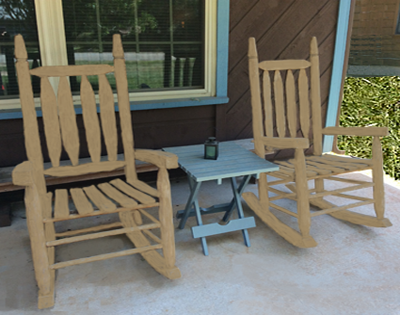– by Christine K. McClelland
Our value to God doesn't depend on what we can do for Him…
"Why did God allow this to happen?" my new friend lamented. "Doesn't He care about me?" Andrea pounded her knee. "I'm so angry at Him."
I slid across the park bench and put my arm around her shoulder. She leaned into me, sobs shaking her body. I remembered the pain I went through not long ago—the similar cries, the feelings of abandonment and hopelessness. I wanted to take away her pain, to make it better. But she needed to learn to cling to His strength, not her own. God would show her how much He loved her. He would give her hope. Now, we wept together.
My mind replayed the past 13 years as I pulled out tissues for both of us. It took eight years for my doctor to identify my illness, Chronic Fatigue and Immune Dysfunction Syndrome (CFIDS). CFIDS is characterized by incapacitating fatigue, neurological problems, and an array of symptoms that can resemble a persistent case of mononucleosis. It can reduce daily activity to below 50 percent of pre-illness performance. Although the symptoms may come and go, they can last for years. My doctor warned me to change my intense lifestyle. My immune system could not fight a serious flu or bacterial infection, especially pneumonia. But I refused to slow down and suffered one relapse after another. I discovered that with two weeks of bed rest, I could slowly return to my frenzied pace.
Unplanned Detour
With my fourth relapse behind me and my husband's business doing well, I quit my job to begin a master's degree program. Determined not to get over-involved, I terminated my involvement in everything except classes and working with the contractor who was building our new home. Three weeks after classes began, thieves burglarized our computer graphics business. Six weeks of insurance red tape passed before we could replace the Macintosh equipment stolen. Five days after the robbery, the transmission in my car failed. We couldn't afford to repair it. Then all the horror stories we'd heard about building came true for us, as our contractor called with bad news. Hello, relapse number five.
I didn't feel I had the luxury to rest, so I ignored the pain. That mistake cost me. For 10 months my condition degenerated with low-grade fevers, sore throats, painful lymph nodes, muscle aches, confusion, difficulty thinking, night sweats, allergies, chemical sensitivities, dizziness, balance problems, insomnia, and the ever-present fatigue that made it difficult to move from chair to chair. Because I had based my worth on what I accomplished and how well I controlled the events around me, I began to panic. I had calculated each potential move. "This time my life will change," I kept thinking. My value will go up, and I'll be able to serve God better. I'll finally find peace and success. But I never found those things. Depression followed.
"Why did you create me this way, Lord? If I am not to get well, why did you give me all these gifts?" It wasn't just the unused gifts that bothered me. I believed God would never be able to use me if I didn't get busy and do something. The harder I tried, the worse things got. I'd commit to an activity and then back out in humiliation. My body couldn't take it. I feared I'd ruined any chance of future ministry because of my inconsistency. I had not yet come to realize that God does not consider me valuable by how much I do for Him. That's why I worked relentlessly to satisfy my emptiness. But ceaseless activity has no part in God's plan. He will work through us for His glory (Rom. 8:28).
God allowed my world to turn upside-down. I questioned my life and my perspective. What would my friends and family think of me now that I couldn't do? What would God think of me? I had failed. Guilt dogged me. Who am I, then, if I am not defined by my gifts and abilities? I stared at my open Bible and said out loud, "I have nothing now, God. Tell me what you want." "When there is nowhere to turn, no explanations which satisfy either mind or heart except in His Word," Elisabeth Elliot wrote in A Path Through Suffering, "it is then that the Spirit opens the understanding of those who turn to Him in their helplessness."
My Own Advice
Shortly after I cried out to God, I met with a friend for espresso. As we sat and sipped in that cozy little coffee shop, we took turns describing our agonies and encouraging each other. I commended her on her desire to honor God since her husband left her. But she rebuffed me, explaining she wasn't good enough for God. "I feel dirty from all the things that have happened," she said. "God wants us to be pure."
"Tina, God has already made you pure. He did that at Christ's death. He saved us—not because we are righteous by what we do—but because of His mercy (Titus 3:5). We were still living in sin—powerless to help ourselves—and Christ died for us (Rom. 5:8)."
Her face lit up. "So even before I became a Christian, God considered me valuable?"
"Yes. When you turn to Him to make your decisions, to live according to what he says, you honor Him. Because of Christ's sacrifice, He sees you as perfect and pure."
"I've been feeling so guilty that I couldn't do enough good deeds," Tina said. "I guess Satan's job is to make the Christian feel guilty and the non-Christian feel not-guilty." She thought a moment and said, "Chris, you shouldn't feel guilty about your illness, then."
Her assessment stunned me. I had missed the truth of my own words—words God had given for both of us. I am valuable even with my illness. He knows everything about me (Matt. 10:30) including my desires (Psalm 37:4), and He prepares the best for me (Jer. 29:11). He does not judge me because of what I can or can't do (Eph. 2:8,9). Jesus taught that all He did and said came from the One who sent Him (John 7:16). God worked through Jesus. "You are my Son, whom I love—with you I am well pleased (Mark 1:11)." As God looks at me through Christ, He is pleased with me also—just as I am.
A New Perspective
I had been thinking of my illness as my biggest problem. My perspective and my response were wrong. "Though we often view trouble as an issue of 'me' versus 'my circumstances,'" writes Joseph Stowell in The Upside of Down, "in reality hope dawns when we refocus our thinking… on the One who controls our circumstances."
Suddenly, the Scriptures I had repeatedly read took on new meaning. Joyful submission to God began to overtake me, because, as John Piper writes in Pleasing God, "God is most glorified in you when you are most satisfied in Him."
During the next six months, God brought frazzled women to me. I listened to their litany of activities and their desperation. I empathized with their conflicting emotions. Each time, God impressed me with the importance of being available for Him to work through me, to love them, to encourage them, to teach them (Titus2:3). But without Him, I can't do anything (John 15:5).
A New Day
Today, God has made up the loss of my salary by increasing the income of my husband's business, which has recovered from the robbery. While I spend most of my time in quiet activities, such as reading or writing, three or four times a week I can participate in physical activities for a few hours—working in the yard, vacuuming, shopping, attending a Bible study, or having lunch with a friend. I hope to take one class next term at the seminary I had been attending before everything fell apart.
Researchers are making discoveries in the treatment of CFIDS that could improve my stamina. Now, though, I am content. I know God has chosen me for this experience to glorify Him (Eph. 1:11-12). I no longer feel the urgency to be doing something or pleasing someone. I take His lead. Which is why I found myself hugging my new friend while she sobbed and despaired that God might not even be aware of her.
"God loves you so much, Andrea. He values you. He knows how painful this is. He understands your desires."
She bit her lip. Her eyes hungered for hope. "Let me pray for you," I said. "Father, please comfort Andrea in her loss. Fill the void she has in her life, so she may experience Your love and Your compassion."
Joni Eareckson Tada, in A Step Further, writes, "One of God's purposes in increasing our trials is to sensitize us to people we never would have been able to relate to otherwise.
Andrea hugged me. "Thank you for listening to me. You're the first person who has demonstrated God's love to me."
And I thought my illness would ruin my life…









